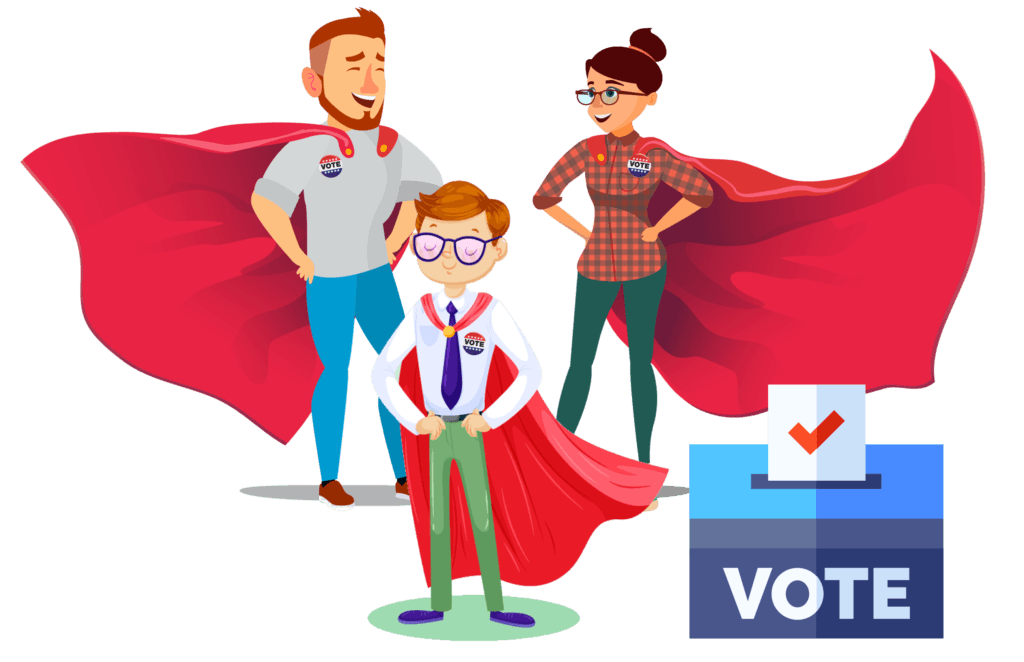How people prioritize their political concerns around a racial, religious, ethnic, sexual, social, cultural or other identity. See which of the 8 political party personalities best matches your identity.
What is identity politics?
Identity politics is the approach of prioritizing concerns related to a particular racial, religious, ethnic, sexual, social, cultural or other identity. In this approach, people focus on forming exclusive political allegiances with others in their group versus pursuing concerns related to a broader group.
It is important to note that Identity Politics can exist as a complement to traditional partisan politics. In other words, certain political groups will appeal to different Identity cohorts of voters – either directly or indirectly.

Where did identity politics come from?
The term was first coined by Black feminist Barbara Smith and the Combahee River Collective in 1974. An original aim of identity politics was for those feeling oppressed to speak about their oppression and suffering under the current status quo. This can be seen in the Combahee River Collective’s terminal statement:
“As children we realized that we were different from boys and that we were treated different—for example, when we were told in the same breath to be quiet both for the sake of being ‘ladylike’ and to make us less objectionable in the eyes of white people. In the process of consciousness-raising, actually life-sharing, we began to recognize the commonality of our experiences and, from the sharing and growing consciousness, to build a politics that will change our lives and inevitably end our oppression….We realize that the only people who care enough about us to work consistently for our liberation are us. Our politics evolve from a healthy love for ourselves, our sisters and our community which allows us to continue our struggle and work. This focusing upon our own oppression is embodied in the concept of identity politics. We believe that the most profound and potentially most radical politics come directly out of our own identity, as opposed to working to end somebody else’s oppression.”

Who engages in identity politics?
Everyone. The left is often accused of engaging in identity politics, but the right engages in it too. However, when people speak about identity, they usually focus on issues such as same-sex marriage, trans people in bathrooms, the fluidity of gender, rape culture, safe spaces, trigger warnings, and the police shootings of unarmed black Americans.

Why is identity politics a contentious subject?
Nowadays, politics isn’t just what you think; it’s who you are. Politics has become personal and become a form of identity for many people. But why now?
America is divided on almost every political issue, and this has caused many to feel threatened and disrespected. When people feel mistreated, they become more isolated, defensive and join up with others who think like them. This creates an us-versus-them mindset.

What is white identity?
White identity is often treated as something different than identity politics, but it plays a huge impact in our politics. According to one recent study of the 2016 election:
“UC Santa Barbara and Stanford University researchers told white voters that minority groups would outnumber white people in the US by 2042. They found that voters who strongly identified as white became significantly more likely to support Trump after they were reminded of the country’s shifting racial demographics.”
According to this study, white Americans feel threatened by America’s growing diversity and can cause them to support ideals and people that preserve the status quo.

What is LGBTQ identity?
LGBTQ identity politics emerged in the 1970s, focusing on urging lesbians and gay men to engage in direct political action to counter societal shame with gay pride. In the feminist spirit of the personal being political, the most basic form of activism emphasized coming out to family, friends, and colleagues, and living life as an openly lesbian or gay person.
In the 2020s, the movement has shifted its focus from promoting tolerance to promoting acceptance and equal rights.



